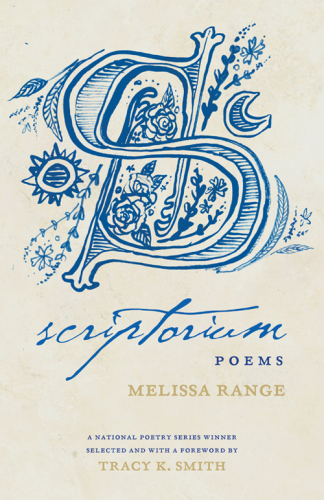
Scriptorium
Poems
کتاب های مرتبط
- اطلاعات
- نقد و بررسی
- دیدگاه کاربران
نقد و بررسی

Starred review from December 5, 2016
Range (Horse and Rider) titles her linguistically graceful and formally exquisite second collection after the room in a medieval monastery that was dedicated to textual transcription. If Range’s book is that room replete with texts, the central text is the Lindisfarne Gospels, an illuminated eighth-century manuscript of the Gospels transcribed by a monk named Eadfrith. Range frequently returns to the Lindisfarne Gospels and the bizarre methods of procuring the pigments necessary for its illumination: a yellow of “arsenic and sulfur,” purple from a snail’s glandular secretions, a crimson of the crushed worm’s eggs from which it takes its name. The document is an effective muse for Range’s imaginative talents, with its “letters traced upon the riven/ calf-skin gleams dark as fresh ash on a shriven/ penitent.” Her historical engagements extend beyond the medieval, however, including references to the 18th-century fire that damaged the original Beowulf manuscript, Navajo talking code used during WWII, Celtic queen Boudicca’s first-century rebellion against the Romans, and a smattering of Old English vocabulary. Range weaves in her own Appalachian history, where “the heart// of the Lord is a seam of coal gouged out/ to fuel the light in other places.” In less gifted hands, the mix of forms and source material could prove too much to handle, but Range’s poise shines throughout.

Starred review from August 1, 2016
As the title suggests, the poems go deep and wide in this National Poetry Series winner (Range's second book, following Horse and Rider), exploring both medieval liturgy and an Appalachian childhood as they depict monks copying religious texts, Navajo code-talking, and a grandmother's accomplished swanning (cursing). A delightful number explore the properties of colors, some unfamiliar (e.g., woad) and others more common (e.g., lampblack). Here's how Range gives life to the latter: "Black as a charred plum-stone, as a plume/ from a bone-fire, as a flume or ravens/ startled from a battle-tree." In "The Fortunes of Men," the poet describes a youngun's birth: "the Lord tracks her/ like a trained coonhound." Besides sharing interesting historical facts, Range's poems show an expertise with form from sonnets to anagrams. But they're anchored by language, both formal and in dialect; note the authentic East Tennessee twang in "Flatter than a flitter, a mountain/ when its top's blown off." These masterly poems are involving, interesting, and rich with musicality. Occasionally, a word is repeated too often, but otherwise they allow readers to experience other places, other times. Even when describing a common farm animal, they sing. VERDICT A collection not to be missed.--Doris Lynch, Monroe Cty. P.L., Bloomington, IN
Copyright 2016 Library Journal, LLC Used with permission.

Starred review from October 1, 2016
A roots poet if ever there was one, Range takes her idiom and subject matter primarily from her east Tennessee mountain homeland and the Christian Middle Ages, that is, from the roots of her speech and the roots of modern Western culture. She doesn't, however, corral the hillbilly poems into one section and the medieval ones into another. Rather, a poem about manuscript illumination may be followed by another about a typical expression in the poet's mountain dialect, and that by one illustrating the apophatic or negative theology of Pseudo-Dionysius the Areopagite. She avoids both folksiness and stuffiness by filling poems with incident, description, elegy, meditation, recollection, identification, and more. Negative Theology focuses on her grandmother's last illness and death. Responding off-kilter to her sister asking for one difference . . . / between Old English and New English, Ofermod relates that Old English word to the character of our kind / of people. Range obviously knows a lot about theology, language, the first English literature, and the downside of Regionalism ( People mock the South wherever I pass through ), and she knows just as much about formal poetry in the wake of Robert Frost. This book is going to dazzle a lot of poetry readers.(Reprinted with permission of Booklist, copyright 2016, American Library Association.)

























دیدگاه کاربران